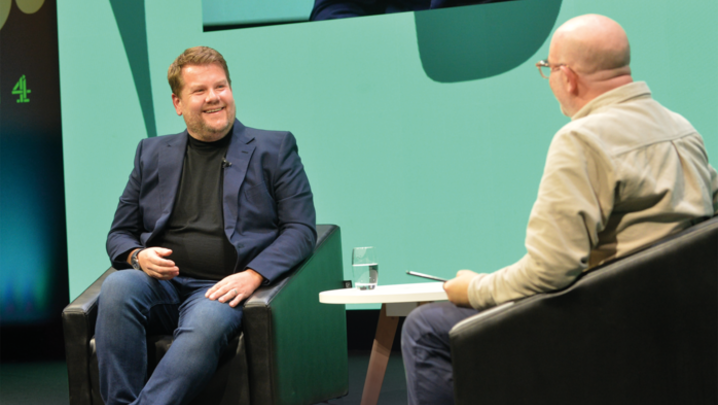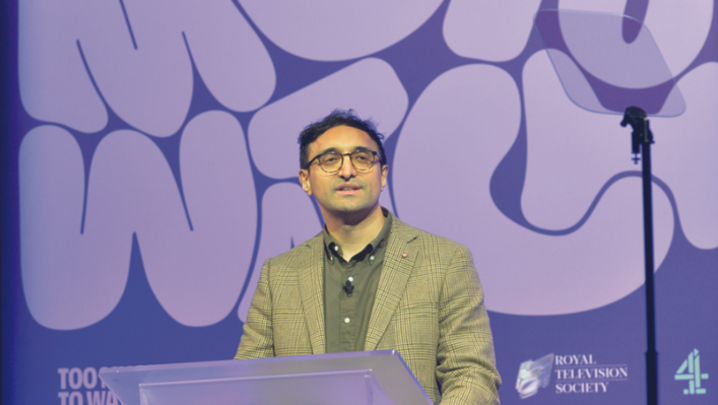At an RTS masterclass, showrunner Frank Spotnitz, whose credits include The X-Files, guides students through the craft of storytelling
It’s 2010, and screenwriter and showrunner Frank Spotnitz sits in a plane at LAX ahead of a 10-hour flight, eager to begin his new life. On the strength of a deal with Sky to air his new spy thriller Hunted, he has sold up, lock, stock and barrel, in the US, and is moving his business, his family and dogs to London.
As the plane taxis to the runway for take-off, he takes a quick call from one of his producers, only to be told that Sky has cancelled the show. Suddenly, Spotnitz is unemployed; Hunted seems dead in the water, along with his European dream.
“But you have to be brave in this business,” he told the capacity audience at an RTS North West Masterclass. “It’s my theme: don’t give up.… It’s the most important thing, not just for writing, but for anything in life.”
It turns out that Hunted was dropped to allow Sky to renew Strike Back for a second season. “So I get myself a British agent… and the next day she calls and says, ‘You’re not going to believe it. I have a job for you already. On Strike Back.’
“And when the BBC green-lit Hunted, Cinemax was so happy with the work I’d done on Strike Back, that it came on board with Hunted, and doubled the budget of that show overnight.”
Following a seven-year career in journalism, Spotnitz cut his TV writing teeth on the groundbreaking sci-fi show The X-Files. He started on the series as a staffer in the writers room – “my second film school” – after meeting the show’s creator, Chris Carter, at a book group.
The writer believes that an important reason for the show’s massive success – 99 awards and 217 nominations, including five Golden Globes – was its “world-building”. In other words, “establishing the place and culture of the imaginary world you’ve invented”.
A key part of this is “making things believable”, he explained. “We always had the motto [that], ‘It’s only as scary as it’s believable’. We wanted you to be afraid to turn off the lights after watching the show. Our strategy for doing that was [to write] everyday situations with ordinary people.”
He carried this mantra forward when building the worlds for his other shows. One example was the dystopian thriller The Man in the High Castle, adapted from the Philip K Dick novel for Amazon. “The book has no narrative… but I wanted to honour Philip K Dick, so what I did was ask, ‘What is this book about?’ [It’s about] how you hold on to your humanity when you’re living in an inhuman world.”
He illustrated his point by showing the RTS a clip of the show, set in a world where Germany and Japan had won the Second World War, in which a “nice all-American, average-guy state trooper” casually explains that, “on Tuesdays, the local hospital burns ‘cripples’ and the terminally ill”.
“That’s what’s so horrifying,” Spotnitz emphasised. “Not that they do it, but that a nice man doesn’t care.”
Similarly, the Nazi officer played by Rufus Sewell is a good, nurturing father. “You can feel it’s believable. That’s why I wanted to do the show. I wanted to say that… [what happened] in the Germany of the 1930s and 1940s can happen anywhere, any time.… Good people can do evil things.”
He gave the many students in the audience an appreciation of what it’s like to work in a writers room. “In the US, we have 24 episodes a year. The studio wants the crew to be shooting every day – they have air dates to meet… The crew needs a new script every eight business days. And it has to work.
"It is only as scary as it is believable"
“You never have a writers room on the first episode. The first episode is a template where the show is defined.
“[Afterwards], you probably have six to eight writers in the writers room… focused on solving problems together. It creates an efficiency and a speed. And you might get a better idea than you ever would have thought of on your own.”
Asked if the writers-room system was competitive, Spotnitz said that a good writers room was self-regulating, because this week “it might be my turn and I’m soliciting ideas from you, but next week it’ll be your turn and you’ll be soliciting ideas from me and the rest of the writers. There’s courtesy and integrity, because you know your turn will come.”
The showrunner is in charge of the room and their decision is final.
“When building a writers room… I ‘cast’ it. I ask: ‘What kinds of conversations will we have in that room?’ I want people with different strengths.
“Deliberately, I don’t meet people until I’ve read their script… I would read your script and you would read mine. Then we’d meet and I’d want to hear what you think of my script. You’d have insights and ideas that are interesting.
“As a showrunner, you want writers who have shown you the respect of reading and understanding what you’ve done. That way, they can bring you things that you never would have thought of on your own, but that are consistent with what you’ve created.
“I also ask: ‘Will you really be passionate about this show?’ Because, if you’re not, it’s not going to be a happy experience.”
The audience gained a valuable insight into the craft of constructing a story for a TV drama in the US. Traditionally, he said, “the format [for a TV episode] was 47 minutes – a teaser or cold open before the main title, then four acts separated by commercial breaks. The teaser will be five to seven pages, then each of your acts 10 to 12 pages,” he said.
Pinning cards to a cork board, Spotnitz took the audience through the process. “You write these cards, putting down ‘Teaser’, ‘Act I’…. And then you begin to imagine scenes.… Write a card that describes the scene that you intend to write.
“What you need to know in order to write that card is: how does the scene begin, how does the scene end, what’s the conflict in the scene?
“The reason why writing by hand is good is that it makes you slow down and reflect on what you’re writing. It gives you time to change things as you go.
“Keep going until you fill up the entire board.… At the end of each act there should be a mini-cliffhanger.… And, by the time you get to your script, it’s much more likely that this road map you’re building will work. You can analyse your story: is the action rising, is my protagonist active?
“It’s a tool. Although I don’t have commercial breaks now, I still write this way.”
With his latest drama series Leonardo, set to hit screens later this year, Spotnitz’s final advice for the student audience was: “Aim for the stars. Really try to make whatever you write as great as it can be.… Audiences are smart.... Work hard at being smart in your writing, at surprising people.”
And, of course: “Don’t give up.”
Report by Carole Solazzo. The RTS masterclass was held on 27 January at the University of Salford. It was hosted by ITV News entertainment correspondent Caroline Whitmore and produced by Rachel Pinkney.







